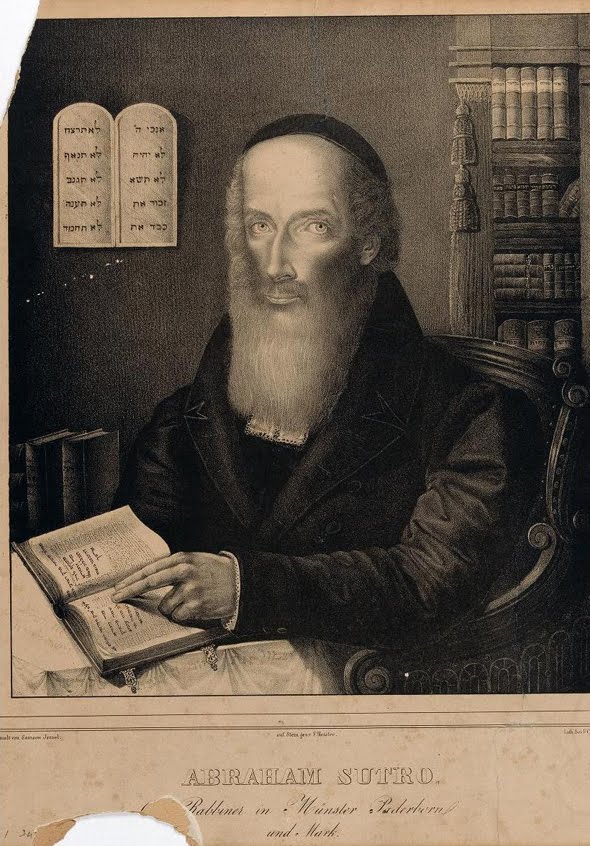This Hebrew literary journal featured writing by the famous and non-so-famous Orthodox rabbis in Germany (and even Hungarian rabbis like R. Moshe Schick) on a variety of topics, ranging from responsa, to chiddushim, to polemics, to poetry, to educational concerns, as well as news.
There's a fascinating section in one particular responsum printed in the 5 Shevat 1853 number (#144, pg. 287). The piece is called תשובה במה שחדשו המתחדשים בעניני בית הכנסת, "Responsum concerning the synagogue innovations of the Reform," by Rabbi Abraham Sutro, av beis din of Münster (1784-186). Rabbi Sutro happens to have been the teacher of Isaac Leeser who was already the leading exponent of traditional Judaism in the United States, a one-man literary whirlwind. Rabbi Sutro was an early exponent of Torah 'im Derech Eretz, propounding it as the proper path and using that precise term for it, even before Hirsch. See, e.g., his first volume of 'מלחמות ה (Hanover 1836; subsequently he published three more volumes with that name between 1862 and 64). He writes the following on page 11:

In any case, in the responsum on synagogue Reforms, he answers three questions. Is it permitted to use an organ on Shabbos? Is it proper to summon people to the Torah by means of a card (קארטען) instead of calling them by their Hebrew name, א ben ב? Is it proper for the synagogue gabbaim to hush people and prevent them from praying loudly and with intensity? You know what the answers are.
Specifically regarding the second question, he begins by stating that the intention of the Reformers is to wipe out Jewish names - "דע כי כל מגמת המחדשים אלו שלא הזכיר שם ישראל עוד ." After a lengthy paragraph citing his halachic sources - this is the lengthiest of the three responsa - he adds another reason why it is a bad thing to give cards and refrain from calling up people by name:

"They also do not realize what anyone who knows current events does, regarding prisons, specifically in Siberia, where the harshness of the punishment for rebels and murderers is that they are no longer referrred to by their name. They are only called "1st, 2nd, 3rd" in order that they should not be remembered and counted any more. Think of the foolishess of these fools. They think by calling people to the Torah in this way that they're honoring them, but actually they are degrading them, causing them to be like people without names like low people. Really we should be very sad for them; and by maintaining our practice we fulfill 'forsake not the teaching of thy mother.'
I thought the reference to Siberian prisons and the dehumanization of prisoners by only calling them by number was interesting.
Here are two pictures of Rabbi Sutro:

No doubt you are wondering what it says in the open volume. The import of his surname was not lost on anyone. Here it is:


The medal he is wearing in the second picture, from 1861, signifies his being awarded membership by the Prussian king in the Order of the Red Eagle, fourth class - whatever that means.





Very interesting! How can you tell what medal he received?
ReplyDeleteLooking very closely. Just kidding. I know it from Lawrence Grossman's short article on Rabbi Sutro in the "Rabbi Joseph H. Lookstein Memorial Volume."
ReplyDeleteHe cites the biography of Rabbi Sutro in Der Israelit 10 (October 27, 1869) and indeed you can read it here. There it says he received the Rothen Adler-Ordnen vierter Klasse from the king.
http://www.medalnet.net/Nichtchristen_Roter_Adler.htm
ReplyDeleteIn view of the shadal post I let google translate for me. (It handles German better than Shas
Midwest
Ah, fascinating. There's always something else to look into. In case anyone doesn't click Midwest's link, it was an award for non-Christians, who presumably couldn't receive royal honors until this order was established.
ReplyDeleteThere were number of orders in the 19th century presenting an alternative (sans cross) version of the badge to non-christian (mainly Turkish) recipients.
ReplyDeletehttp://en.wikipedia.org/wiki/Order_of_the_Red_Eagle
http://en.wikipedia.org/wiki/Order_of_St._Anna
http://www.medalnet.net/Non_Christian_Red_Eagle.htm
Any idea where his unusual surname originated from?
ReplyDeleteThis was his nephew (son of his brother Emanuel):
ReplyDeletehttp://en.wikipedia.org/wiki/Adolph_Sutro
Is "Sutro" a particularly Jewish name? I ask because in one of the Sherlock Holmes stories, there is a character- a lawyer- named "Sutro."
ReplyDeleteNo, no. It was a regular medal/order, but it contained a cross. The king didn't want to insult non-Christians by this, so he commissioned an alternative pattern of the same medal/order. He obviously was more motivated not to piss off people like the Turkish foreign minister than some random Jew in a Prussian province but decided "lo plug", which actually did annoy many of the Jews among the recipients, because they didn't want to be stigmatized.
ReplyDeleteI thought "Zutra" was not the amora's real name, but just a kinui due to the man's short stature, similiar to R. Zeira (although there is hock about the latter I think I once saw in a Tosfos [Tosafos].) Maybe Rabbi Sutro was on the short side? I know a family named Kurtz in which almost everyone is short.
ReplyDeleteAgav, is there any info about that practice in Siberia? Did they really try to erase the man's name altogether, or was it done, like the Nazis, for organizational purposes? Intressante.
No idea, but I'm not sure that you can really separate dehumanization from organization. To me it sounds more like the thing which people said about it rather than some kind of official policy. But it seems pretty obvious that when people refer to someone as Thing 1 and Thing 2 they're not really taking care to preserve their human dignity.
ReplyDeleteThe Syrians in Brooklyn call up aliyas by saying "kohen/levi/shelishi/etc. ha‘oleh ya‘amod bekhabod", no names. At least that's what i heard/saw them do during weekday leining -- maybe it's different on Shabatt.
ReplyDelete